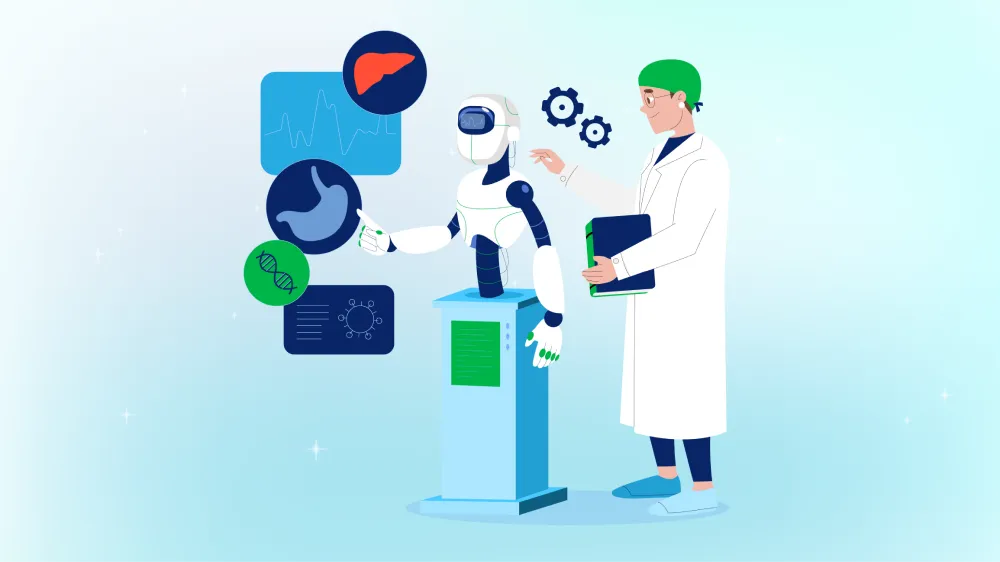Artificial Intelligence (AI) is transforming and revolutionising businesses in the present time, and no other industry is better positioned to benefit from it than the healthcare industry. Although a lot of the consumer-facing AI tools make the headlines, the real power of AI is found when we turn it inward on our own processes within healthcare by automating data. DADOS AS, a research electronic data capture system, paved the way for this change by optimizing workflows, increasing efficiency, and improving patient results.
This article discusses how enterprise AI is transforming healthcare, the use cases, benefits, and ethical issues.
The Financial Impact of AI in Healthcare
The AI healthcare promise is more than just convenient. There is a possibility of substantial cost savings and increased efficiency. AI-powered applications could cut nearly $360 billion in annual U.S. administrative costs, according to a report by McKinsey. And by streamlining previously time-consuming administrative tasks, including scheduling, maintaining patient data, and billing.
For midsize systems and community health centers, this financial relief can mean the difference between solvency and insolvency. Funds can be diverted to patient care or facility services while maintaining operational efficiency.
Simplifying Workflows and Decision-Making Through AI
There’s a lot of complexity in how health systems operate, and AI is really good at simplifying complex workflows. Organizations can use analytics and predictive models to address process inefficiencies in areas such as patient admissions, resource distribution, and diagnostic tests.
A first example in practice is Doctiplus, an online doctor and telemedicine service that can provide consultations at a very low price in just a few minutes, avoiding long waiting times to see a doctor. Solutions such as these are examples of AI-driven health care solutions that reduce the daily bureaucratic burden while ensuring timely patient care.
Predictive Analytics in Action
Predictive analytics is another application where healthcare professionals extract transformational value through AI. For instance:
- Patient Flow Management: Predictive models forecast patient influx, allowing optimal staff and resource allocation.
- Disease Prediction: Algorithms can analyze patient histories to flag risks of chronic conditions like diabetes or hypertension early.
- Emergency Preparedness: AI tools predict surges or outbreaks, allowing health centers to prepare for resource-intensive scenarios proactively.
The Evolution of AI in Healthcare
AI in HealthCare has had a long, rich history. In the beginning, rule-based systems offered once-and-for-all reasons for tasks as diverse as analyzing decision trees and generating diagnostic propositions. Now, the technology has evolved to sophisticated, predictive LS based on big data and cloud computing. Models like ours, AIDAN Systems, are a demonstration of what can be done with case-based systems to diagnose huge datasets and to make care models more nuanced, as well as allowing for greater clinical and operational efficiency.
This shift is about more than added capability; it’s about taking a step towards personalized care, focused on the patient, by leveraging aggregated data and machine learning. These considerations are critical in low-resource community health contexts, where these advances present real prospects for scaled-up quality of care provision.
Identifying High-Value AI Use Cases in Healthcare
When considering AI adoption, healthcare organizations must prioritize low-risk, high-value applications that simultaneously improve productivity and care delivery. Common areas with enormous potential include:
- Medical Imaging: Reducing errors in diagnostics with faster scans.
- Administrative Automation: Streamlining back-office operations like patient onboarding and claims processing.
- Population Health Management: Identifying trends and allocating resources effectively for underserved populations.
Tools like Aidan Systems’ “AI Fit Assessment” help organizations identify where they can maximize ROI while minimizing risks, ensuring seamless adoption with measurable results.
Ethical Considerations in AI Deployment
While the opportunities of AI are vast, its deployment in healthcare also raises critical ethical questions:
- Data Privacy and Governance: Ensuring patient data security is paramount. Systems like DADOS employ robust data governance protocols to ensure compliance with regulations like HIPAA.
- Bias in Algorithms: Human intervention is essential when training models to avoid biases that inadvertently harm patient populations.
- Model Retraining: Continuous retraining of AI models ensures they adapt to shifting environments, new data, and evolving healthcare standards.
For AI to succeed in healthcare, these considerations must be deeply integrated into implementation strategies. Ethical AI is not just a “nice-to-have” but the foundation of trust between healthcare organizations and the patients they serve.
Case Studies in Transformative AI Platforms
Two platforms, AIDAN Systems and DADOS, stand out for their roles in streamlining healthcare operations.
AIDAN Systems
Quentin Fisher established AIDAN Systems. It uses AI-powered analytics and predictive modelling to enhance the value of healthcare workflows. From small community health centers to mid-sized hospitals, the solution has helped streamline reporting and facilitate better decisions, allowing healthcare providers to spend less time on administrative tasks and more time with patients.
DADOS Project offers a robust data collection system for clinical and research data support. Intuitive interface and broad-based interoperability with EMR DADOS enables:
- Patient-Reported Outcomes: Collecting and analyzing outcomes reported by patients themselves.
- Cross-Center Studies: Managing multi-site research projects seamlessly with integrated reporting tools.
- Predictive Capabilities: Leveraging predictive analytic models to support care decisions.
By bridging clinical data with analytics, the DADOS platform is helping organizations deliver more effective, data-driven care while reducing inefficiencies in healthcare workflows.
A New Era of Data-Driven Healthcare
AI is no longer a buzzword from the future, but rather a real, actionable, and transformative force in the healthcare space. By streamlining the cost structure, maximizing workflow efficiency, and changing the way care is delivered, AI is empowering healthcare providers to provide more care as well as identify and correct systemic inefficiencies.
Utilizing tools like DADOS for data collection, analysis, and action provides a way for organizations to satisfy the rigorous requirements of modern healthcare. Likewise, using appropriate platforms can help facilitate more efficient and convenient patient care, which leads to increased confidence and satisfaction among patients.
AI in healthcare is thought of as a disruptor in digital health services, and organizations keen to leverage AI should start by considering the use cases and ethical use cases before collaboratively implementing AI. Begin small, test and measure, and grow in confidence as you scale up.

